|
| |
|
|
| |
| Worldly Possessions |
| Documentary Series by Gerlinde Böhm |
The 21-part documentary series ‚Worldly Possessions’ shows the variety of family life in our world. It is not the exotic or unusual that is at the heart of these portraits, but rather material possessions and the circumstances of life in various different corners of the world. The films concentrate on something which is not normally considered of importance: everyday life in the microcosm of a family. How do people live on a farm in Mali, in a small town in Greenland or in the slums of Salvador da Bahia? How important is a TV set for a family in Guatemala, how is the workload shared between a husband and wife in Hong Kong?
The families portrayed are the authors of their own stories. There is no commentary in these films. The family members talk of their worries and problems, share their dreams and their definitions of happiness. They offer a very personal insight into their world. In this way we are taken on an unusual journey around the world, a journey which focusses on people’s wishes and needs and thereby confronts us with the question of how we live our lives
|
| |
| Kyrgyzstan |
Because it is hard to find work in Kyrgyzstan today, the doctor Kalbübü and her husband Kanatbek, an engineer, gather their sheep and horses to move from their village to the mountains for the summer. There they live in a traditional shack without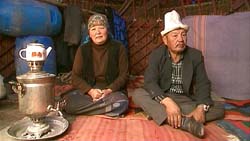 water and electricity on the side of a country road. They sell Kymus as a refreshment drink to the people passing through. It is fermented mare milk, which is very popular in this region. For the winter they move back to their house in the village where they live a completely different life. Being furnished with warm water and electric appliances, they are especially proud of their television and the electric heating. The couple, which has raised eleven children, cannot imagine living in another country without the mountains, their sheep, and their horses. water and electricity on the side of a country road. They sell Kymus as a refreshment drink to the people passing through. It is fermented mare milk, which is very popular in this region. For the winter they move back to their house in the village where they live a completely different life. Being furnished with warm water and electric appliances, they are especially proud of their television and the electric heating. The couple, which has raised eleven children, cannot imagine living in another country without the mountains, their sheep, and their horses. |
| press fotos |
|
  
|
| |
| Greenland |
Many traditions haven’t lost their importance in modern Greenland. Every winter, fisherman Peter rides his dog-pulled sleigh out onto the iced fjord, to hunt seals and snow grouses,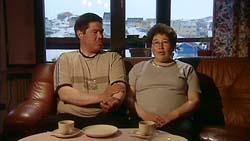 or to fish for halibut. He and his wife Daaya, a teacher in a public kindergarten, live with their three children in the small northern town of Ilulissat. Daaya de-scribes her traditional costume as her most treasured possession, which she wears on public holidays only. Whether they could imagine living in another country? No, but Daaya would like to live in another place, which is further in the north. That is where the winter is more severe, one lives in closer touch with nature, and where the people live in stronger accordance with the traditions of the Inuit. or to fish for halibut. He and his wife Daaya, a teacher in a public kindergarten, live with their three children in the small northern town of Ilulissat. Daaya de-scribes her traditional costume as her most treasured possession, which she wears on public holidays only. Whether they could imagine living in another country? No, but Daaya would like to live in another place, which is further in the north. That is where the winter is more severe, one lives in closer touch with nature, and where the people live in stronger accordance with the traditions of the Inuit.
|
| press fotos |
|
  
|
| |
| Brazil |
“There are no more machos”, Vivaldo thinks, but his fantasies describe something else. If he could, he says, he would own a harem. The former security guard and the laundress Vera live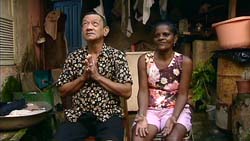 in a plain quarter of Salvador da Bahia in the north east of Brazil. Since he has been laid off because of his age Vivaldo helps his wife to iron the mountains of laundry, which she carries back and forth in huge parcels to the households of wealthy families. – Three generations live in the small house under one roof. Only the support of all the children helps the family to pull through to some degree. Vivaldo loves his old stereo and Vera is enthusiastic about the “Tele-Novas” a popular soap opera, which she watches on TV at night. She dreams of traveling to Rio de Janeiro or Sao Paulo for at least once in her lifetime, to see the nice scenery, which she only knows from television. in a plain quarter of Salvador da Bahia in the north east of Brazil. Since he has been laid off because of his age Vivaldo helps his wife to iron the mountains of laundry, which she carries back and forth in huge parcels to the households of wealthy families. – Three generations live in the small house under one roof. Only the support of all the children helps the family to pull through to some degree. Vivaldo loves his old stereo and Vera is enthusiastic about the “Tele-Novas” a popular soap opera, which she watches on TV at night. She dreams of traveling to Rio de Janeiro or Sao Paulo for at least once in her lifetime, to see the nice scenery, which she only knows from television.
|
| press fotos |
|
  
|
| |
| Mali |
Yacuba is a farmer in Mali one of the poorest countries in the world. Like most of the people here he lives in a polygamous marriage in the country in a big family community. Several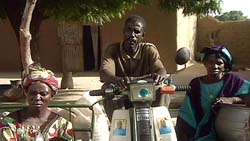 brothers share a farm, where they live with their wives and children. The eldest member of the family is often overseeing as many as 80 people. Yacuba grows pea-nuts, beans, millet and rice. His wives sell these products on the market in a nearby village, which they reach after a two-hour ride on a donkey cart. Both, Asan and Masta, talk surprisingly open about their suffering from the polygamous marriage. They often think about marrying a rich man – preferably a European. brothers share a farm, where they live with their wives and children. The eldest member of the family is often overseeing as many as 80 people. Yacuba grows pea-nuts, beans, millet and rice. His wives sell these products on the market in a nearby village, which they reach after a two-hour ride on a donkey cart. Both, Asan and Masta, talk surprisingly open about their suffering from the polygamous marriage. They often think about marrying a rich man – preferably a European.
|
| press fotos |
|
  
|
| |
| Guatemala |
High in the mountains, at the shore of Lake Atitlan, Juan and Maria live with their seven children. At home they weave colorful material for their indian dresses, that are typical for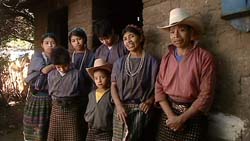 the region. Juan also grows corn and goes fishing on the lake at night. There is just enough corn for the family. Maria sells the fish at a market on the other side of the lake. Juan is the only one of the family, who, besides his native language Caqchiquel, can speak a little Spanish and hardly can sign a document. His eldest daughter Santa starts to cry when she describes the humiliation, which is part of her illiterate daily life. the region. Juan also grows corn and goes fishing on the lake at night. There is just enough corn for the family. Maria sells the fish at a market on the other side of the lake. Juan is the only one of the family, who, besides his native language Caqchiquel, can speak a little Spanish and hardly can sign a document. His eldest daughter Santa starts to cry when she describes the humiliation, which is part of her illiterate daily life. |
| press fotos |
|
  
|
| |
| Hong Kong |
Queenie and Abun live on the 32nd floor of a modern skyscraper in the centre of Hong Kong. They share their modest 711 square feet flat with their twins, Sihlok and Siwing, and their Philippine maid Marian. In sight of Hong Kong’s unemployment rates going up dramatically, it is not completely common anymore for a married couple, to be both working: Queenie is a marketing manager, Abun works as a goldsmith. But aside from a lot of work, the family finds leisure time in going on long walks in the area, to church on Sunday, as well as the children’s activities such as piano lessons and Kung-Fu. Both parents know that Hong Kong is becoming more and more modernized, which is why they are trying to teach their children the old Chinese traditions, to help them maintain their cultural roots. Siwing, and their Philippine maid Marian. In sight of Hong Kong’s unemployment rates going up dramatically, it is not completely common anymore for a married couple, to be both working: Queenie is a marketing manager, Abun works as a goldsmith. But aside from a lot of work, the family finds leisure time in going on long walks in the area, to church on Sunday, as well as the children’s activities such as piano lessons and Kung-Fu. Both parents know that Hong Kong is becoming more and more modernized, which is why they are trying to teach their children the old Chinese traditions, to help them maintain their cultural roots.
|
| press fotos |
|
  
|
| |
| Samoa |
The policeman Musu and his wife Ake live within a large family, that consist of three generations. Their house is situated on an overwhelmingly beautiful beach on the Samoan island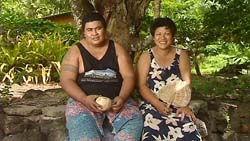 Upolu. His parents, as well as the children, have to participate in earning some money for the family: the money from catching fish, running a small plan-tation and his sparse policeman-salary have to be enough. Dressed in his white shirt and equipped with his sunglasses and the Samoan Lavalava – a traditional cloth, bound around the hips – the 150 kg man patrolls along the market of the capital. Unarmed, of course, since the “most effective weapon of a Samoan man is his word.” Lazalo and Junior take care of the house- and fieldwork. Their sister Miriama instead is free after school – being an unmarried and virgin girl, she is the “jewel” of the family and hardly has any domestic obligations. Upolu. His parents, as well as the children, have to participate in earning some money for the family: the money from catching fish, running a small plan-tation and his sparse policeman-salary have to be enough. Dressed in his white shirt and equipped with his sunglasses and the Samoan Lavalava – a traditional cloth, bound around the hips – the 150 kg man patrolls along the market of the capital. Unarmed, of course, since the “most effective weapon of a Samoan man is his word.” Lazalo and Junior take care of the house- and fieldwork. Their sister Miriama instead is free after school – being an unmarried and virgin girl, she is the “jewel” of the family and hardly has any domestic obligations.
|
| press fotos |
|
  
|
| |
| Refugees in Uganda |
| Not so long ago they possessed two blankets, five spoons, six plates and one bowl. Now the only things left are a cooking pot und the clothes they’re wearing. A fire has destroyed the straw hut, in which the refugees Vianey and Radegonde lived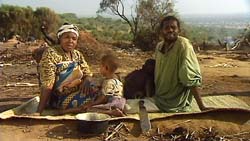 with their three children for one year. In 1994 they had to leave Rwanda. From Tan-zania, where they found refuge, they were evicted in 2002. Since then they are on the run again. Along with 5000 other people from Rwanda they are waiting in camp Kibati in Uganda for their official recognition as refugees. None of the international assistance organizations supports these people until their status is clear. They even don’t have any official entitlement to receive water rations. Vianey works as a day laborer for the domestic farmers. After a long walk he reaches their fields, where the former public servant does his hard manual work. A green Banana shrub, worth half a dollar, is his wage per day. “We have given up to set ourselves a goal or to think about the future”, Vianey says. with their three children for one year. In 1994 they had to leave Rwanda. From Tan-zania, where they found refuge, they were evicted in 2002. Since then they are on the run again. Along with 5000 other people from Rwanda they are waiting in camp Kibati in Uganda for their official recognition as refugees. None of the international assistance organizations supports these people until their status is clear. They even don’t have any official entitlement to receive water rations. Vianey works as a day laborer for the domestic farmers. After a long walk he reaches their fields, where the former public servant does his hard manual work. A green Banana shrub, worth half a dollar, is his wage per day. “We have given up to set ourselves a goal or to think about the future”, Vianey says.
|
| press fotos |
|
  
|
| |
| Haiti |
| Marie, Réme Jean-Francois, and five children live in the city of Jacmel at the southern coast of the country. Both are tailors. Even if Maria would sew during day and night, there wouldn’t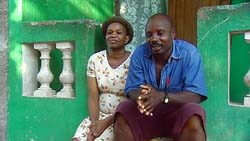 be enough money to pay for food, school, electricity, and house repairs. Réme deals in planks on the side and and grows fruit on a small piece of land. They have water in Jacmel twice a week only. Then they fill as many containers as they can find. But at least they have an adequate power supply. For twelve years the family is building its own house. Finally, it is supposed to be finished in two years. Marie dreams of following her father to Miami, to work there making more money. While Réme hopes for better conditions in his own country. He dreams of a nice house, a big car, and a store of his own. He won’t give up his hope until he dies. be enough money to pay for food, school, electricity, and house repairs. Réme deals in planks on the side and and grows fruit on a small piece of land. They have water in Jacmel twice a week only. Then they fill as many containers as they can find. But at least they have an adequate power supply. For twelve years the family is building its own house. Finally, it is supposed to be finished in two years. Marie dreams of following her father to Miami, to work there making more money. While Réme hopes for better conditions in his own country. He dreams of a nice house, a big car, and a store of his own. He won’t give up his hope until he dies.
|
| press fotos |
|
  
|
| |
| Cambodia |
| Until today Cambodia is suffering from the trauma caused by the leadership of the Khmer Rouges. “It was living like hell”, Ngob Ngét says. The teacher and his wife Sâm-Ol, who is a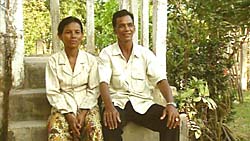 weaver, live with their five children, a grand child, and Sâm-Ol’s Father in a village of the province Takeo, south of Phnom Penh. On some days, when her daughters run the household, Sâm-Ol weaves six feet of silk. The retailer pays her a Dollar for it. Ngob Ngét has a monthly income of 15 Dollars as a teacher. So the rice fields are the real life savers. They give all of them enough to eat; the family can buy clothes and medicine, and they can afford to send their children to school. Although Ngob Ngét and Sâm-Ol still have to do without power and running water in their village, they don’t want to live anywhere else than in Cambodia. weaver, live with their five children, a grand child, and Sâm-Ol’s Father in a village of the province Takeo, south of Phnom Penh. On some days, when her daughters run the household, Sâm-Ol weaves six feet of silk. The retailer pays her a Dollar for it. Ngob Ngét has a monthly income of 15 Dollars as a teacher. So the rice fields are the real life savers. They give all of them enough to eat; the family can buy clothes and medicine, and they can afford to send their children to school. Although Ngob Ngét and Sâm-Ol still have to do without power and running water in their village, they don’t want to live anywhere else than in Cambodia.
|
| press fotos |
|
  
|
| |
| USA |
| Mike and Jan Rudeen live with their 12 year old daughter Olivia and 8 year old twins Chris and Ben in Denver, Colorado. In order to spend enough time with the children, Jan works at home as a freelance journalist. Mike on the other hand takes a daily drive to the Rocky Mountain News where he in a large open-space office answeres Customer questions and writes the Lifestyle column.
The family lives in the attractive green middle class suburb in the middle of town. Both the Bio- Supermarket and the children’s school are just around the corner. It as a struggle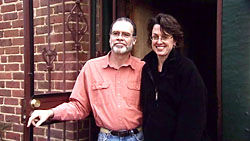 though, for the couple to keep up with the living standards of their middle class environ-ment. The cost of servicing the two old cars are a great worry, and they have already started saving for the future college education of their three children. They can not afford cable television- something the twins greatly hold against them who would, really like to watch Simpsons and Sponge Bob at the breakfast table. though, for the couple to keep up with the living standards of their middle class environ-ment. The cost of servicing the two old cars are a great worry, and they have already started saving for the future college education of their three children. They can not afford cable television- something the twins greatly hold against them who would, really like to watch Simpsons and Sponge Bob at the breakfast table.
Both Mike and Jan are outraged by the Presidents political steps taken after 11. September 2001. They, together with other members from Jan’s church, which lies very close to her heart, took part in the demonstration against the Irag-war.
The Rudeens are pretty much satisfied with their lives except for little Ben wishes himself a “million dollars” for his next birthday...
|
| press fotos |
|
  
|
| |
| Botswana |
| Close to all residents in the little town of Jwaneng are employed at the diamond mine. That is where Philip Tlou works as a Catering manager. He comes from humble beginnings and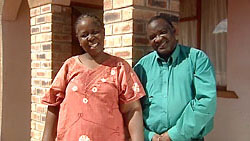 earned himself his current position through hard work. He is married to Boikhutso Tlou, who at first refused to take him as he wore shorts and a very silly hat. Today Philip describes her as the perfect wife and his pillar of support. Heavy heartedly Boikhutso has learned to live with the fact, that her husband also has three other children with another woman and raises them because the saying in setswana goes “the children belong to their father”. earned himself his current position through hard work. He is married to Boikhutso Tlou, who at first refused to take him as he wore shorts and a very silly hat. Today Philip describes her as the perfect wife and his pillar of support. Heavy heartedly Boikhutso has learned to live with the fact, that her husband also has three other children with another woman and raises them because the saying in setswana goes “the children belong to their father”.
The teenagers in the family have finished school and are trying their level best to establish careers. In general the youth is threatend by AIDS. As the HIV infection rate is soaring at 36%, 10% of the youth in Jwaneng are HIV positive. He has already buried three of his friends, 20 year old Pako reports, two were his age, one, a little younger. The times when the young buried the old are over he says.
Every two months the family pays a visit to their home village from which the father originates, this is where the catering manager keeps his cattle, without which, no motswana man can be considered a real man. Philp lives up in his village. This is where he was born and this is where he wishes to be buried. On the contrary his sons find the village life rather dull. No electricity, no running water and no place to go out to in the evenings, by walking about in the darkness one only risks stepping on snakes and scorpions. |
| press fotos |
|
  
|
| |
| Bulgarien |
| Galja and Kostadin live with their two children in Veliko Tarnovo, a picturesque town of 70,000 inhabitants in the north of Bulgaria. Galja recently got a PhD in maths and teaches at the university. Her monthly wage of 190 euros forms the main part of the family income, which she augments by giving private lessons. Kostadin, whose hobbies include photography and writing poetry, teaches maths in a school in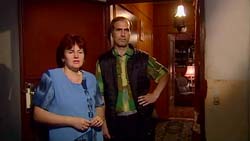 the Turkish area of town. Once a month the family visit the grandparents who live in the country. Their pensions are so small that they only manage to keep their heads above waters by relying on fruit and vegetables from their own garden. The family from town also stock their larder up with grandma’s preserves and this helps them to keep their household costs down. Svetljo, the 15 year-old son, is dreaming of a life as a computer programmer in Los Angeles. His sister Vassilena wants to travel to as many countries as possible. She is about to set off on her first trip to Germany, where she will spend four weeks picking apples and cherries somewhere between Leipzig and Dresden for a wage of 3,24 euros per hour. the Turkish area of town. Once a month the family visit the grandparents who live in the country. Their pensions are so small that they only manage to keep their heads above waters by relying on fruit and vegetables from their own garden. The family from town also stock their larder up with grandma’s preserves and this helps them to keep their household costs down. Svetljo, the 15 year-old son, is dreaming of a life as a computer programmer in Los Angeles. His sister Vassilena wants to travel to as many countries as possible. She is about to set off on her first trip to Germany, where she will spend four weeks picking apples and cherries somewhere between Leipzig and Dresden for a wage of 3,24 euros per hour. |
| press fotos |
|
  
|
| |
| Oman |
The Wahiba-Desert in Sultanate of Oman: Muhammad al Mughairy lives here with his wife Salama and their eight children. The Mughairy tribe has been settled here for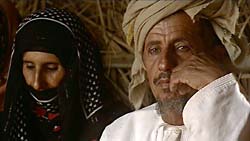 centuries.
The family’s homestead is sur-
rounded by dry palm twigs to provide some shade. All the water for the family as well as the livestock is brought in daily from the nearby settlement. The camels and goats along with the small date plantation are all the wealth of the family. centuries.
The family’s homestead is sur-
rounded by dry palm twigs to provide some shade. All the water for the family as well as the livestock is brought in daily from the nearby settlement. The camels and goats along with the small date plantation are all the wealth of the family.
The beduines of Wahiba-Sands sell their camels even abroad to Saudi Arabia and the United Emirates. A successful race camel brings a lot of money. But the family does not show this off: A few pots and pans, some colourful carpets on the walls and in the sand.
The wealthy Sultanate provides modern schools all throughout the country. Even from the desert the children are brought to and fro by school bus and this possibility for education have given the Beduines the opportunity to combine a modern lifestyle with their desert tradition.
Rashid, the oldest son of the Al Mughairy family, runs a small camp where tourists can spend the night. He takes the guest reservations right on his mobile and meets his business partners regularly in the capital city of Muscat. Yet he always makes a point to return to the desert quickly, because, as he puts it, only in the desert there is peace and freedom. |
| press fotos |
|
  
|
| |
| India |
|
A small village not far from Mumbay, on the western coast of the Indian Subcontinent: old spacious wooden houses surrounded by large gardens, tropical vegetation and a whole row of Hindu temples for the population of barely 4.500 inhabitants.
This is where Family Thosar is living – four generations in one house. Great-Grandpa, now 91 years old, used to travel the country with a mobile cinema, his son Prakash farms on a small plantage, growing coconut and banana. Prakash’ son, Prashant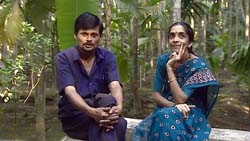 in turn makes a living reapairing the age old rikshas and motorbikes of the villagers. His wife Pranali works at the computer in a small shop which sells bottled gas. In her spare time Pranali takes lessons in classical singing. The Brahman family are strict vegetarians, religious rituals are an integral part of their daily routine and they have a great ease about them. Following the age old traditions not only the grandparents’ marriage was an arranged match, but also Pranali, now 27, met her husband only once before they were wedded. The parents do not doubt that also their own young son will later marry the match they chose for him. The entire family places great hope in the cheery 5-year old boy: he is to become a doctor and be the provider for his parents and grandparents. in turn makes a living reapairing the age old rikshas and motorbikes of the villagers. His wife Pranali works at the computer in a small shop which sells bottled gas. In her spare time Pranali takes lessons in classical singing. The Brahman family are strict vegetarians, religious rituals are an integral part of their daily routine and they have a great ease about them. Following the age old traditions not only the grandparents’ marriage was an arranged match, but also Pranali, now 27, met her husband only once before they were wedded. The parents do not doubt that also their own young son will later marry the match they chose for him. The entire family places great hope in the cheery 5-year old boy: he is to become a doctor and be the provider for his parents and grandparents. |
| press fotos |
|
  
|
| |
| Chile |
| Jaqueline and Jaime have three sons between 11 and 15 years of age. They live in Valparaiso, a picturesque Chilean seaport spreading over a number of hills stretched along the bay. All three boys attend a state school in which money is so scarce that the parents do a lot of the upkeep work themselves, like painting the walls and cleaning the toilets. The children spend their leisure time at the seaside, they go skating or try to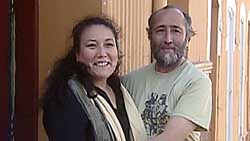 make some money by juggling at the traffic lights. The children have followed in their parents footsteps in terms of political engagement: Victor runs his own website explaining the cruel facts of bullfighting. Matías agitates against Nike´s policy of letting children work in their sweatshops. The youngest, Raimundo, likes to go to a cemetery where he steals some fruit for his mother and himself. Jaqueline and Jaime got to know one another during the time of the Junta dictatorship. make some money by juggling at the traffic lights. The children have followed in their parents footsteps in terms of political engagement: Victor runs his own website explaining the cruel facts of bullfighting. Matías agitates against Nike´s policy of letting children work in their sweatshops. The youngest, Raimundo, likes to go to a cemetery where he steals some fruit for his mother and himself. Jaqueline and Jaime got to know one another during the time of the Junta dictatorship.
Both were commited members of the socialist party. Their marriage was initially politically motivated, “but also somehow a love story”, as Jaqueline says. If she could make a wish? She would like to live in a country with mutual human respect and where the social contrasts would not be as big as in Chile. |
| press fotos |
|
  
|
| |
| Portugal |
| Maria Joao and Henrique Costa and their children, the 12 year old Leonor and 7 year old Luís, live in the north of Portugal in the city of Porto, picturesquely located at the river Douro.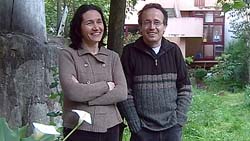 Henrique is born here and really loves his town with its many bridges and romantic alleys. "Porto used to be a village and has grown to be a city", he says. A city with full size traffic problems, proudly bearing the label "cultural heritage of mankind". Henrique is born here and really loves his town with its many bridges and romantic alleys. "Porto used to be a village and has grown to be a city", he says. A city with full size traffic problems, proudly bearing the label "cultural heritage of mankind".
Maria Joao and Henrique lead a marriage with equal rights. Having the more flexible working hours as an administrator at the academy of dramatic arts, Henrique takes charge of more of the daily chores than his wife. She works in a very demanding position as the head of a public library, but as important as Maria Joao considers her work, she also places great value in the family. For her it is the crucial stronghold in life.
Even though Henrique and Maria both make their contributions to the family budget their total income is not luxurious, but still they don’t need to be stingy. In the first place, they spend their money on the children’s education. Both Leonor and Luís visit a private music school. Little Luís is still practicing at the xylophone, his sister Leonor already plays the harp for some years. Apart from her English and French lessons she also takes some German. Though she admits that it still sounds “quite funny”. |
| press fotos |
|
  
|
| |
| Madagascar |
|
A small village in the mountains of Madagascar where the air is cool and the soil is poor. This is the home of the Zafmaniri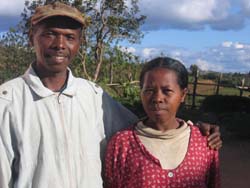 people. They live in all wooden houses which are built without using a single nail and bear ornamental carvings. There is sufficient water, but the agricultural yield is barely enough to sustain the families. However, there is no other source of income for Eugene who lives here in Antoetra together with his wife Augustine and their six children. people. They live in all wooden houses which are built without using a single nail and bear ornamental carvings. There is sufficient water, but the agricultural yield is barely enough to sustain the families. However, there is no other source of income for Eugene who lives here in Antoetra together with his wife Augustine and their six children.
Augustine did not have a say with the choice of her husband. She had her first child at the age of 15. Celestine, Augustine’s mother-in-law, thinks that the fact that today still all the decisions in the family are made by the men alone is behind the times: men should learn to listen to their wives.
Augustine’s thoughts constantly circle around why life is such and around the daily struggle for money. Meanwhile her son Odilo dreams of one day flying in an airplane to see Madagascar from above. At the age of 12 Odilo has already quit school in order to earn a few cents by chopping firewood.
Hardly anyone in the village of Antoetra can afford shoes. But on the occasion of the national holiday everybody gets dressed up as much as they are able to. The villagers have a torch procession, slaughter some of the Zebu cattle to distribute the meat in the community and they sing the national anthem in a three part choir. |
| press fotos |
|
  
|
| |
| Papua New Guinea |
|
Popna and Monga do not know their own ages, but they do know that 4 of their 12 children died before they were even given names. The family lives in a village in the Highlands of Papua New Guinea not far from the town of Mount Hagen. The soil is fertile, practically all their food is self-grown. Apart from the farming most of the family members have a job in town. Popna for instance is a caretaker at a school. But his earnings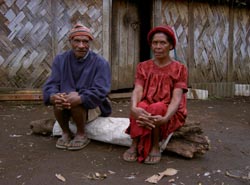 there are not even enough for the old man to buy a mattress or a blanket. The women bear the full burden of the household work on top of their jobs. That’s what they are “bought” for by the men: for a wealthy man the bride price which is negotiated with the woman’s family can be as high as 10.000 Euro plus 200 pigs. there are not even enough for the old man to buy a mattress or a blanket. The women bear the full burden of the household work on top of their jobs. That’s what they are “bought” for by the men: for a wealthy man the bride price which is negotiated with the woman’s family can be as high as 10.000 Euro plus 200 pigs.
Clan wars still exist today. Sometimes a small quarrel or a traffic accident is enough of a trigger. The clan remains to be at the center of everyones life. The entire clan also pays the deceased their last respects: The mourning ritual takes a whole week.
On the day of independance the cultural heritage is particularly of great importance: The children paint their faces and dressed in the traditional costumes they perform the various dances of the country’s different tribes. |
| press fotos |
|
  
|
| |
| Morocco |
Si Mohammed and his 30 years younger wife Fatimah live with their 7 children in Essaouira. The small town at the Southern coast of Morocco is well known for its picturesque old city. 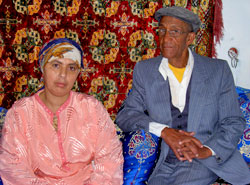 There in the Medina Si Mohamed runs a small shoe shop. His 18-year old son Younes helps the old father in the shop, but his big passion is surfing. The two elder sons are independent already: Azzadin is taxi driver and Jamal repairs fridges. Nezha, the oldest daughter, has set up her own busy hair dressing studio in a small room at home. In her free time she writes short stories which poetically express the difficulties of young women’s lives in this Islam country. There in the Medina Si Mohamed runs a small shoe shop. His 18-year old son Younes helps the old father in the shop, but his big passion is surfing. The two elder sons are independent already: Azzadin is taxi driver and Jamal repairs fridges. Nezha, the oldest daughter, has set up her own busy hair dressing studio in a small room at home. In her free time she writes short stories which poetically express the difficulties of young women’s lives in this Islam country.
Still Morocco is modernizing with new legislation ruling marriage and divorce. Yet Fatimah, the mother of the 7 children, has still had to suffer in the traditional women’s role. When she was 16 she was wed against her will to the significantly older man. Since then she has been wearing the Jellaba and veil when she leaves the house and has to ask her husband for permission for every step she takes. The daughters are being raised more liberally with western dress and MTV. They are also able to read and write, contrary to their mother who envies the European tourists who, as she puts it, never waste their time, because they always have a book with them. |
| press fotos |
|
  
|
| |
| Russia |
Kolja and his wife Nelja live with thier two grown-up daughters in a village in the Southern Urals region. Nelja used to be the work brigade leader of an agricultural compound with hothouses - today she receives only a small pension which is below the subsistance minimum. Her husband Kolja has become an independent farmer in 1990. 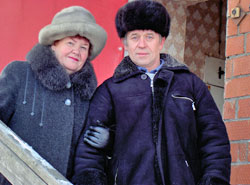 He is glad that he does not share the fate of many of his neighbours who have lost their work during the perestroika. Some of them have now moved to the city. They sold their small houses to rich new Russians who are drawn to living in the countryside. He is glad that he does not share the fate of many of his neighbours who have lost their work during the perestroika. Some of them have now moved to the city. They sold their small houses to rich new Russians who are drawn to living in the countryside.
The two daughters of the family are married to policemen. Olja has trained as a seamstress and is presently out of work. Larissa is doing the office work for the pension plan insurance from her computer at home while her daughter Nastja is still little. To send Nastja to the day care is unaffordable for the family.
Not far from the village of the family is a special attraction where Larissa often likes to go for outings: several small Russian-Orthodox churches are hidden away in the snowy woods. They are dedicated to the family of the last Tsar which was assassinated in the close by town of Ekaterinburg. A few years back Larissa has discovered religion for herself. She sais in church the soul gets peaceful and the thoughts become pure.
The men in the family are proud of the women. They figure that it is not for nothing that foreigners come especially to Russia to look for wives. They maintain that after all, the Russian women are not only more diligent, but also more beautiful then women in the rest of the world. |
| press fotos |
|
  
|
| |
| |
| Production |
Gerlinde Böhm Filmproduction |
| In Corporation with |
ZDF / ARTE |
| Time of Production |
2001 till 2006 |
| Script, Direction |
Gerlinde Böhm |
| Camera |
Ralf Klingelhöfer, Chris Völschow |
| Sound |
Oliver Lumpe |
| Editor |
Petra Kader-Göbel |
| Associate Producer |
Anja Schürmanns, Bianca Bodau |
| |
|
| Technical Data |
| Format |
Digital Betacam |
| Length |
26 min. Per Episode |
| Aspect Ratio |
16:9 |
| |
|
| |
|
|
|
|
| |
|
|
| |
 |
|
| |
|
|
|
|
